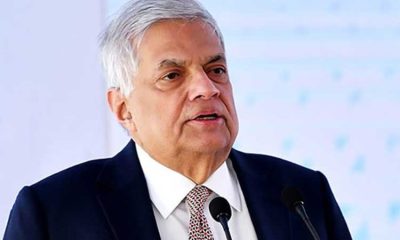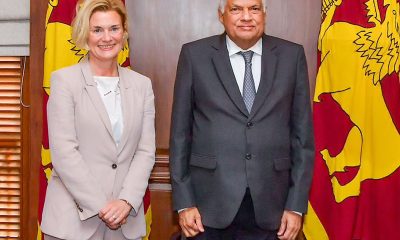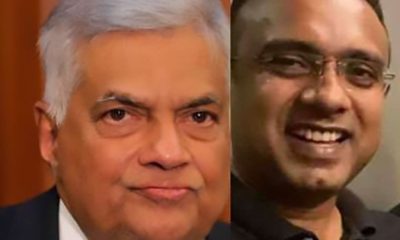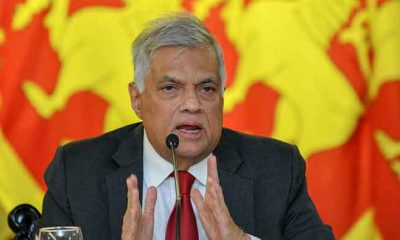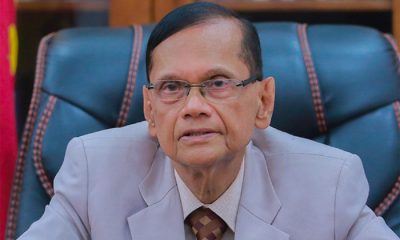News
‘Bring in Petroleum, Water Acts to address power sector crisis’
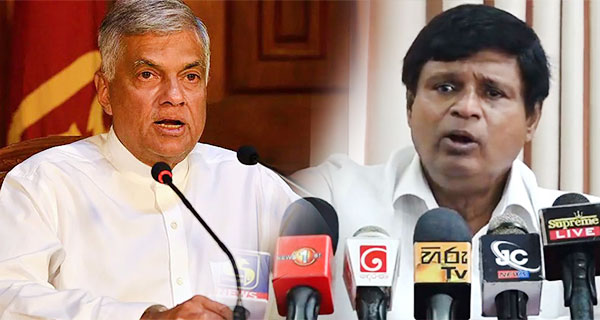
SJB asks Prez whether he is only interested in fully implementing 13 A
By Shamindra Ferdinando
Convenor of the Samagi Joint Trade Union Alliance, Ananda Palitha, yesterday (07) alleged that the failure on the part of successive governments to properly implement the Public Utilities Commission (PUC) Act No 35 of 2002 prevented the PUC from performing its regulatory responsibilities.
Palitha said that as long as this Act, introduced during Ranil Wickremesinghe’s tenure as the Prime Minister of the UNP-led UNF government, way back in 2002, remained not fully implemented, electricity consumers wouldn’t get a fair deal.
The primary reason for the ongoing controversy, over the proposed electricity hike, approved by the Cabinet-of-Ministers, was the non-implementation of the relevant Act, the former UNP activist said.
Former Ceylon Petroleum Corporation (CPC) employee, Ananda Palitha, switched his allegiance to the SJB, in the wake of the UNP split in the run-up to the last parliamentary election, in August 2020.
The trade union leader said that President Ranil Wickremesinghe should take immediate measures to implement the relevant Act. Referring to President Wickremesinghe’s recent declaration that he would have no other option but to fully implement the 13th Amendment to the Constitution as it was law of the country, the SJB activist urged the UNP leader to implement the PUC Act, as well.
In terms of this Act, the PUC is the watchdog for Petroleum and Water, in addition to Electricity, Palitha said. Pointing out that though the PUC received authority to regulate the electricity industry, in terms of Sri Lanka Electricity Act No. 20 of 2009, Palitha said that respective Acts, pertaining to Petroleum and Water, were yet to be passed by Parliament.
The Act, passed in 2002, was meant to empower the PUC as the economic, technical and safety regulator of Water, Petroleum and Electricity sectors. Palitha said that in spite of the PUC Chairman Janaka Ratnayake’s declaration of his readiness to regulate the Petroleum and Water sectors, Parliament was dragging its feet. The SJB representative said so in response to The Island queries.
Asked whether his trade union alliance intended to pressure the Wickremesinghe-Rajapaksa government over this issue, Palitha said that those at the helm of political authority should realize that full implementation of the (PUC) Act of No 35 of 2002 would benefit the government. Proper regulation of Electricity, Petroleum and Water would enable the PUC to make available services, at an affordable price, Palitha said.
Instead, successive governments had deliberately denied constitutional authority to the PUC for obvious reasons, Palitha said, alleging that those who financially benefited through ‘deals’ kept the overall process under their control.
Referring to the abortive bid made by the Human Rights Commission (HRC) recently to provide electricity, without interruption, during the duration of the Advanced Level examination, and its decision to seek judicial intervention in that regard, Palitha questioned the responsibility of Parliament. Palitha said that the electricity industry was in deepening turmoil as the issues therein couldn’t be addressed unless the PUC received oversight powers over Petroleum and Water sectors, too.
Palitha declined to comment on recent accusations that he, along with the Secretary of the Electricity Consumers’ Association, Sanjeewa Dhammika, threatened two PUC members, Mohan Samaranayake, and its Deputy Chairman Udeni Wickremesinghe, as the matter was before the Fort Magistrate Court. Since then Samaranayake and Wickremesinghe sent in their resignation letters.
Asked whether he expected the PUC to address the issues at hand, the SJB official pointed out that progress couldn’t be made until Parliament enacted the relevant Petroleum and Water acts, on the lines of the Sri Lanka Electricity Act No. 20 of 2009. Palitha said that the recent disclosure of Lanka Coal Company Chairman Shehan Sumanasekera’s urgent request for money for procurement of coal underscored the crisis in the power sector. “All this is part of a continuing drama. Have you ever heard of any previous Coal Company Chairman discussing such a matter with the media,” Palitha asked.
Sumanasekera has warned of possible disruption of operations at the Norochcholai coal-fired power plant complex, unless USD 12.32 mn (Rs. 4.56 billion) could be made available.
Palitha said that the government was trying to justify steep increases in electricity tariffs. The ongoing crisis was brazenly used by interested parties to pursue their agenda meant to facilitate the privatization of the CEB, Palitha said, urging the Opposition to pressure the government to enact the relevant Acts, pertaining to the Petroleum and Water sectors.
The trade unionist said that he was quite surprised that the Opposition, and all those demanding a system change, pushed hard for legislation that would make far reaching change in the lives of the hapless public, as well as save industries from collapse, due to intolerable power tariffs.
Against the backdrop of a near 70 percent power tariff increase last year, if electricity rates go up by another 65% percent, consumers would have to implement their own blackouts to save on electriity bills, the SJB official said.
News
US sports envoys to Lanka to champion youth development

The U.S. Embassy in Colombo welcomed the U.S. Sports Envoys to Sri Lanka, former National Basketball Association (NBA) and Women’s National Basketball Association (WNBA) players Stephen Howard and Astou Ndiaye, from June 8 through 14.
The Public Diplomacy section of the U.S. Embassy said that it would launch a weeklong basketball program intended to harness the unifying power of sports, made possible through collaboration with Foundation of Goodness and IImpact Hoop Lab.
While in Sri Lanka, Howard and Ndiaye, both retired professional basketball players, will conduct a weeklong program, Hoops for Hope: Bridging Borders through Basketball. The Sports Envoys will lead basketball clinics and exhibition matches and engage in leadership sessions in Colombo and Southern Province for youth aged 14-18 from Northern, Uva, Eastern and Western Provinces, offering skills and leadership training both on and off the court. The U.S. Envoys will also share their expertise with the Sri Lanka Basketball Federation, national coaches, and players, furthering the development of basketball in the country. Beyond the clinics, they will collaborate with Sri Lankan schoolchildren to take part in a community service project in the Colombo area.
“We are so proud to welcome Stephen and Astou as our Sports Envoys to Sri Lanka, to build on the strong people-to-people connections between the United States and Sri Lanka,” said U.S. Ambassador Julie Chung. “The lessons that will be shared by our Sports Envoys – communication, teamwork, resilience, inclusion, and conflict resolution – are essential for leadership development, community building, equality, and peace. The U.S. Sports Envoy program is a testament to our belief that sports can be a powerful tool in promoting peace and unity.”
News
Rahuman questions sudden cancellation of leave of CEB employees

SJB Colombo District MP Mujibur Rahuman in parliament demanded to know from the government the reasons for CEB suspending the leave of all its employees until further notice from Thursday.
MP Rahuman said that the CEB has got an acting General Manager anew and the latter yesterday morning issued a circular suspending leave of all CEB employees with immediate effect until further notice.
“We demand that Minister Kanchana Wijesekera should explain this to the House. This circular was issued while this debate on the new Electricity Amendment Bill was pending. There are many who oppose this Bill. The Minister must tell parliament the reason for the urge to cancel the leave of CEB employees,” the MP said.However, Speaker Mahinda Yapa Abeywardena prevented Minister Wijesekera responding to the query and said that the matter raised by MP Rahuman was not relevant.
News
CIPM successfully concludes 8th Annual Symposium

The Chartered Institute of Personnel Management (CIPM) successfully concluded the 8th Annual CIPM Symposium, which took place on 31st May 2024. Themed “Nurturing the Human Element—Redefining HRM in a Rapidly Changing World,” the symposium underscored the pivotal role of human resource management (HRM) in today’s dynamic global landscape. Since its inception in 1959, CIPM has been dedicated to advancing the HR profession through education, professional development, and advocacy, solidifying its position as Sri Lanka’s leading professional body for HRM.
Ken Vijayakumar, the President of the CIPM, graced the occasion as the chief guest. The symposium commenced with the welcome address by the Chairperson, Prof. Arosha Adikaram, followed by the Web Launch of the Symposium Proceedings and Abstract Book by the CIPM President. The event featured distinguished addresses, including a speech by Chief Guest Ken Vijayakumar, President of CIPM, and an address by Guest of Honor Shakthi Ranatunga, Chief Operating Officer of MAS Holdings Pvt. Ltd., Sri Lanka.
The symposium also featured an inspiring keynote address by Prof. Mario Fernando, Professor of Management and Director of the Centre for Cross Cultural Management (CCCM) at the University of Wollongong, Australia.
Vote of Thanks of the inauguration session was delivered by Dr. Dillanjani Weeratunga, Symposium Co-chair.
The symposium served as a comprehensive platform for researchers to present their findings across a wide range of critical topics in HRM. These included Cultural Diversity and Inclusion, Talent Development and Retention, Ethical Leadership and Corporate Social Responsibility, Adapting to Technological Advancements, Mental Health and Well-being at Work, Global Workforce Challenges, Employee Empowerment, and Reskilling and Upskilling.
The plenary session was led by Prof. Wasantha Rajapakse. Certificates were awarded to the best paper presenters during the valedictory session, followed by a vote of thanks delivered by Kamani Perera, Manager of Research and Development.
The annual symposium of CIPM was a truly inclusive event, attracting a diverse audience that spanned undergraduates, graduates, working professionals, research scholars and lecturers. This widespread interest highlights the symposium’s significance in the field of HRM, offering a unique opportunity for everyone to network and learn from scholarly brains.The CIPM International Research Symposium was sponsored by Hambantota International Port, Sri Lanka Institute of Information Technology (SLIIT), E B Creasy & Co. PLC, and Print Xcel Company.


